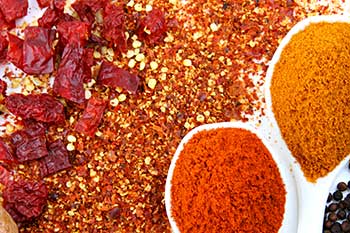More Health and Nutrition Bites
Related
Will eating spicy foods help you lose weight?
There has been research that indicates eating meals spiced with chilies increases fat burning as well as the amount of energy used by the body. Researchers have felt that this might be an approach to fighting obesity, and in an interesting study reported in this month's American Journal of Clinical Nutrition (2006;84(1):63-69), a group of 36 volunteers agreed to eat chilies for the advancement of science.
Rice, Chilis, GERD and IBS
A researcher in Thailand noted that most of the research on GERD and IBS focuses on a Western diet and wondered if two of the major features of the Thai diet - rice and spiciness - would have a positive impact on either disorder.
Dieting? Spicy Foods May Help
It sure seems like it ought to be true: when you eat spicy foods, you might feel warm and break out into a sweat, just as you would if you were exercising. Unfortunately, what research there is into the metabolic effects of eating capsaicin (the substance responsible for the spiciness in chilies) showed no effect on a person's resting metabolic rate.
Health & Nutrition Bites
Get the latest health and diet news - along with what you can do about it - sent to your Inbox once a week. Get Dr. Gourmet's Health and Nutrition Bites sent to you via email. Sign up now!
Eat spicy food: live longer?

There's been a great deal of interest in the role of spices in general on overall health, with research showing that various spices can affect gut bacteria and act as antibacterial agents. While it seems clear that eating spicy food doesn't increase your metabolism, it does appear that it may help you control your weight through greater satiety while also helping you control blood sugars.
A team in the People's Republic of China used data gathered through a large-scale, fairly long-term study known as the China Kadoorie Biobank, which included nearly half a million men and women from 10 diverse areas across China (BMJ 2015;351:h3942 doi:10.1136/bmj.h3942). In 2004 the participants provided demographic, health, and lifestyle behavior information to the researchers. Height, weight, blood pressures, blood glucose and cholesterol levels were all measured by medical professionals at the start of the study. The causes of death of those who died over the course of the 4-year study were collected by the study authors and validated through medical records.
The authors asked the participants to estimate how often they ate spicy foods each week, on average, and what spices did they use when they did? The authors asked about the most common sources of spice in the Chinese diet - fresh chili peppers, dried chili peppers, chili sauce, and chili oil, as well as "other or don't know."
In their analysis, the researchers took into account such variables as Body Mass Index; smoking status; family health history; intake of red meats, fruits, and vegetables; level of physical activity, diabetes, high blood pressure, and more. They found that those who described themselves as eating "hot spicy foods" at least 3 days per week were 14% less likely to die from any cause than those who said they ate spicy foods once a week or less.
This inverse association was strongest among those who ate fresh chili peppers, and those peppers seemed to have the greatest effect on the risk of death from cancer, heart diseases, and diabetes. Even more interesting is that this effect was strongest on those who consumed the least alcohol.
What this means for you
Despite its large size, what this study does not show is why spicy foods had this effect. The authors take into account many variables, but one thing they did not do is look at the participants' overall diets: were those eating spicier foods also eating something with them that might help account for this effect? Once again we're reminded that people eat food, not nutrients - or ingredients. That said, if you like spicy food (and food containing fresh red chili peppers is fairly spicy), this study suggests that you may live longer if you eat it regularly.
First posted: October 14, 2015
